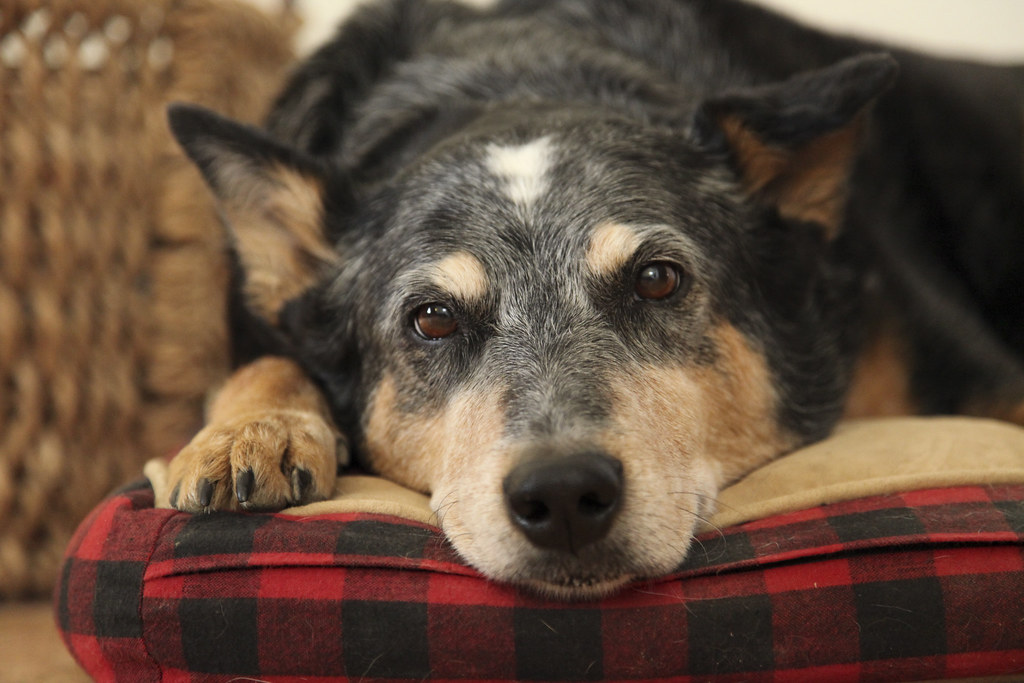Discover the 19 potential signs of dog dementia, also known as canine Alzheimer’s or cognitive dysfunction. Learn how to recognize these symptoms in your aging dog and understand the impact on their quality of life. Stay informed and provide the best care for your furry companion.

What is Dog Dementia?
Dog dementia is a condition that affects older dogs and can cause a decline in cognitive function, memory, and awareness. It is similar to Alzheimer’s disease in humans and is also known as cognitive dysfunction syndrome or Canine Cognitive Dysfunction (CCD).Dog dementia is a progressive brain disease that affects older dogs, especially those over the age of 10.
Causes of Dog Dementia
The exact causes of dog dementia are not fully understood, but research suggests that it may be caused by a combination of genetic, environmental, and lifestyle factors. Some of the factors that may contribute to the development of dog dementia include age, genetics, poor nutrition, lack of exercise, exposure to toxins, chronic stress, and pre-existing medical conditions such as hypothyroidism, liver or kidney disease, and brain tumors.Some of the factors that could contribute to the development of dementia in dogs include:
- Age
- Genetics
- Poor nutrition
- Lack of exercise
- Exposure to toxins
- Chronic stress
- Pre-existing medical conditions such as hypothyroidism, liver or kidney disease, and brain tumors.
Symptoms of Dog Dementia
The symptoms of dog dementia can vary from dog to dog, but some of the most common signs include disorientation and confusion, changes in sleep patterns, increased anxiety and agitation, loss of house training skills, reduced interest in food, changes in social behavior, loss of spatial awareness, staring into space or at walls, lack of response to commands, excessive barking or howling, increased irritability or aggression, and wandering aimlessly.
19 Potential Signs of Dog Dementia
Here are 19 potential signs of dog dementia to look out for:
- Increased confusion and disorientation
- Difficulty recognizing familiar people or places
- Reduced interest in toys or activities
- Changes in sleep patterns, such as sleeping more during the day and less at night
- Increased anxiety or restlessness
- Loss of house training skills
- Decreased appetite or interest in food
- Changes in social behavior, such as becoming withdrawn or aggressive
- Inability to learn new commands or tricks
- Difficulty following familiar routines
- Lack of spatial awareness, such as bumping into furniture or walls
- Staring into space or at walls
- Excessive barking or howling
- Increased irritability or aggression
- Loss of balance or coordination
- Wandering aimlessly
- Forgetting previously learned behaviors, such as “sit” or “stay”
- Unusual vocalizations, such as whimpering or crying
- Pacing or circling repetitively
Diagnosis of Dog Dementia
If you suspect that your dog may have dementia, it’s important to take them to see a veterinarian. The vet will perform a physical examination and may recommend additional tests such as blood work, urine analysis, and imaging tests like an MRI or CT scan. These tests can help rule out other medical conditions that could be causing your dog’s symptoms.
Treatment for Dog Dementia
While there is no cure for dog dementia, there are several treatment options that can help manage the symptoms and slow down the progression of the disease. Treatment options may include medication, dietary changes, environmental changes, and behavioral therapy. Your vet may recommend a combination of these treatments depending on your dog’s.
Conclusion
Dog dementia can be a challenging and heartbreaking condition to deal with, but with proper treatment and management, you can help your furry friend live a comfortable and happy life. If you suspect that your dog may have dementia, it’s important to seek veterinary care as soon as possible. Early diagnosis and treatment can make a big difference in the quality of life for your beloved pet.
Frequently Asked Questions (FAQ)
What is dog dementia?
Dog dementia, also known as Canine Cognitive Dysfunction (CCD), is a condition that affects older dogs and causes a decline in cognitive function, memory, and awareness. It is similar to Alzheimer’s disease in humans.
What are the symptoms of dog dementia?
The symptoms of dog dementia can vary from dog to dog, but some of the most common signs include disorientation and confusion, changes in sleep patterns, increased anxiety and agitation, loss of house training skills, reduced interest in food, changes in social behavior, loss of spatial awareness, staring into space or at walls, lack of response to commands, excessive barking or howling, increased irritability or aggression, and wandering aimlessly.
What causes dog dementia?
The exact causes of dog dementia are not fully understood, but research suggests that it may be caused by a combination of genetic, environmental, and lifestyle factors. Some of the factors that may contribute to the development of dog dementia include age, genetics, poor nutrition, lack of exercise, exposure to toxins, chronic stress, and pre-existing medical conditions such as hypothyroidism, liver or kidney disease, and brain tumors.
How is dog dementia diagnosed?
If you suspect that your dog may have dementia, it’s important to take them to see a veterinarian. The vet will perform a physical examination and may recommend additional tests such as blood work, urine analysis, and imaging tests like an MRI or CT scan. These tests can help rule out other medical conditions that could be causing your dog’s symptoms.
Is there a cure for dog dementia?
Unfortunately, there is no cure for dog dementia. However, there are several treatment options that can help manage the symptoms and slow down the progression of the disease. Treatment options may include medication, dietary changes, environmental changes, and behavioral therapy.
How can I help my dog with dementia?
There are several things you can do to help your dog with dementia, including providing a consistent routine, avoiding sudden changes, using familiar scents and sounds, providing plenty of mental stimulation, and ensuring they have a comfortable and safe environment.
Can dog dementia be prevented?
While there is no guaranteed way to prevent dog dementia, there are several things you can do to reduce the risk of your dog developing the condition. These include providing a healthy and balanced diet, regular exercise, mental stimulation, regular check-ups with your veterinarian, and minimizing exposure to toxins.
How long does it take for dog dementia to develop?
The progression of dog dementia can vary from dog to dog, and it can take several months to several years for the condition to fully develop. It’s important to keep an eye out for early warning signs and to seek veterinary care if you suspect your dog may have dementia.
Can younger dogs get dog dementia?
While dog dementia is more commonly seen in older dogs, it is possible for younger dogs to develop the condition. However, it is much less common in dogs under the age of 7.
Can dog dementia be fatal?
While dog dementia itself is not fatal, it can lead to a decline in overall health and quality of life. It can also increase the risk of accidents and injuries, such as getting lost or falling down stairs.
Can dogs with dementia still enjoy life?
Yes, dogs with dementia can still enjoy life with proper care and management. It’s important to provide them with plenty of mental stimulation, a comfortable and safe environment, and lots of love and attention.
What is the best way to care for a dog with dementia?
The best way to care for a dog with dementia is to work closely with your veterinarian to develop a treatment plan that is tailored to your dog’s individual needs. This may include medication, dietary changes, environmental modifications, and behavioral therapy. You should also provide plenty of mental and physical stimulation, a consistent routine, and a safe and comfortable environment. It’s important to be patient, understanding, and loving with your dog as they navigate this challenging condition.
How can I prevent my dog from developing dementia?
While there is no surefire way to prevent dog dementia, there are several steps you can take to help reduce your dog’s risk. This includes providing a healthy and balanced diet, regular exercise, mental stimulation, regular check-ups with your veterinarian, and minimizing exposure to toxins. It’s also important to keep an eye out for early warning signs of the condition and to seek veterinary care as soon as possible if you suspect your dog may have dementia.
Are certain breeds more prone to developing dementia?
While any dog can develop dementia, certain breeds may be more prone to the condition. Some of the breeds that are commonly affected by dementia include Cavalier King Charles Spaniels, Dachshunds, Boxers, German Shepherds, and Golden Retrievers.
Can diet play a role in the development of dementia in dogs?
Yes, diet can play a role in the development of dementia in dogs. Poor nutrition and a lack of essential nutrients can increase the risk of cognitive decline in older dogs. It’s important to provide your dog with a healthy and balanced diet that is rich in antioxidants, omega-3 fatty acids, and other essential nutrients that support brain health.
Can supplements help prevent or manage dementia in dogs?
Some supplements, such as omega-3 fatty acids and antioxidants, have been shown to have beneficial effects on cognitive function in dogs. However, it’s important to talk to your veterinarian before giving your dog any supplements, as they can interact with medications and may not be appropriate for all dogs.
Can training and socialization help prevent dementia in dogs?
Yes, providing regular training and socialization opportunities can help keep your dog’s mind sharp and may help prevent or delay the onset of dementia. Engaging in regular training sessions, providing plenty of mental stimulation, and ensuring your dog has opportunities to socialize with other dogs can all help support cognitive function.
Can early intervention help manage dementia in dogs?
Yes, early intervention is key to managing dementia in dogs. The earlier the condition is diagnosed, the sooner treatment can begin, which can help slow down the progression of the disease and improve your dog’s quality of life.
What is the prognosis for dogs with dementia?
The prognosis for dogs with dementia depends on the severity of the condition and the age and overall health of the dog. While there is no cure for dementia, with proper management and treatment, many dogs with the condition are able to enjoy a good quality of life for several years. However, it’s important to work closely with your veterinarian to develop a treatment plan that is tailored to your dog’s individual needs.
What are the treatment options for dog dementia?
Treatment options for dog dementia may include medication, dietary changes, environmental modifications, and behavioral therapy. Medications such as selegiline and propentofylline may help improve cognitive function in some dogs, while dietary changes may involve feeding a diet that is high in antioxidants, omega-3 fatty acids, and other essential nutrients. Environmental modifications may include providing a safe and comfortable environment with plenty of mental stimulation, while behavioral therapy may involve training exercises and other techniques designed to improve cognitive function.
How can I help my dog with dementia feel more comfortable?
To help your dog with dementia feel more comfortable, it’s important to provide a safe and comfortable environment with plenty of mental and physical stimulation. This may include providing a soft and comfortable bed, creating a consistent routine, and providing plenty of opportunities for exercise and play. You may also consider providing your dog with toys and puzzles that are designed to stimulate the mind and help improve cognitive function.
How can I cope with caring for a dog with dementia?
Caring for a dog with dementia can be challenging, but there are several things you can do to help cope with the condition. This may include seeking support from friends and family, joining a support group for caregivers of dogs with dementia, and working closely with your veterinarian to develop a treatment plan that is tailored to your dog’s individual needs. It’s also important to take care of yourself by getting enough rest, eating a healthy diet, and engaging in regular exercise and self-care activities.
Can dementia in dogs be misdiagnosed?
Yes, dementia in dogs can sometimes be misdiagnosed, as some of the symptoms of the condition can be similar to other health problems. It’s important to work closely with your veterinarian to ensure an accurate diagnosis and to rule out any other underlying health issues that may be causing your dog’s symptoms.
Is euthanasia a consideration for dogs with dementia?
Euthanasia may be a consideration for dogs with dementia in cases where the condition is severe and the dog’s quality of life is significantly impacted. However, this is a deeply personal decision that should be made in consultation with your veterinarian and based on your dog’s individual needs and circumstances. It’s important to consider all treatment options and to ensure that your dog is comfortable and well-cared for throughout the course of their illness.
Thank you for visiting Loving Pet Parents! We’re passionate about providing helpful information and resources to pet owners. If you’ve enjoyed reading our articles, we invite you to explore more of our content on our website. You’ll find a wealth of information on pet care, behavior, nutrition, and much more. Plus, we’re always adding new articles and resources to help you give your furry friend the best possible care. So why not bookmark our website and check back regularly for new content? We appreciate your support and look forward to sharing more valuable insights with you!
All About the Legendary Bengal Cat
Top 10 Low-Maintenance Tropical Fish That Are Easy to Care For
10 Effective Ways to Help Cats Bond With Babies | Expert Guide
Mastering Obedience Training: A Comprehensive Guide for Pet Owners
Discover the Cure for Swim Bladder Disease:Floating with Confidence
Ultimate Guide: How to Take Care of Goldfish | Expert Tips
Why Do Dogs Howl?: Unlocking the Mystery Behind Their Melodic Calls
Complete Betta Fish Care Guide For Beginners: Everything You Need
Betta Fish Fin Rot: Symptoms, Causes, Prevention & Treatment
Discover Why Do Cats Rub Against You?
5 Effective Strategies to Prevent Cats From Pooping Outside the Litter Box
Cat Bathing Mastery: Unlock the Secrets to a Scratch-Free Experience!
Why Do Cats Stare at Me? Unveiling the Hidden Secrets Behind Their Mesmerizing Gazes
200+ Funny and Clever Fish Names: Hilarious Ideas for Naming Your Aquatic Friends
Dog Training 101: How to Completely Train Your Dog
Common Cat Health Problems: How to Keep Your Cat Healthy
Are Calico Cats Always Female? The Surprising Truth Revealed
We hope you’ve found our articles informative and helpful in caring for your furry companion. If you think our content could benefit other pet owners, we would greatly appreciate it if you shared it with your friends and family. By sharing our articles, you’ll be helping to spread valuable information that can improve the lives of pets and their owners. You can share our articles on social media, through email, or by simply telling others about our website. We thank you for your support and for helping us reach even more pet lovers with our content.






